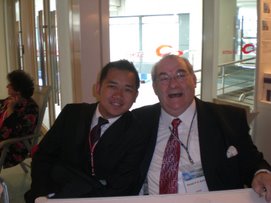When we get into the assertive habit, our automatic response to interpersonal situations is a feeling of confidence. As a result, we handle them with calm assurance and feel great. Confidence breeds confidence. If you want to get the same assertive habit, learn how to respond confidently to the following situations.
1. Handling Praise. It is natural to feel pleased when we are paid a compliment from people we care about but we should always remember that they are only the views of others and that such views can always change.
To handle compliments confidently, keep in mind these points...* watch for signs of praise-addiction. Praise is nice but it should not be necessary for our own self-esteem.* thank people simply. Don't dismiss it when someone offers you praise, however sincerely you believe it was meant.* use the technique of positive assertion and positive enquiry to find out what other people liked, so you can do more of it.
2. Handling Criticism. Criticism can hurt when it is expressed insensitively: "...I've only one criticism to make" or unskillfully: "...that was rubbish!"; or comes from people whose admiration we crave. When we are harshly criticised, it is tempting to either hit back at the critic or find someone else to blame. If we do neither of these, we may end up blaming ourselves and feeling bad.
The confident response to criticism is to...* get it straight in your head that this is only someone else's opinion. You can't make people like you.* take a wider view. Ask yourself how things will look in a month's time.* go to "the gallery". This is a place off-stage where you can consider what was said dispassionately.* try to swallow your pride and learn something from the criticism. You can do this by using the technique of negative enquiry and assertion.
3. Saying No. We all find ourselves occasionally in situations where we say "Yes" to others when we really want to say "No": the boss who uses the willing workhorse; the mother-in-law who invites herself to stay; the friend who insists on buying you another round. You may think you are being "nice" by going along with their request but the chances are they won't see it that way and will simply impose on you again. You have exposed your weakness for them to exploit.
Reacting angrily to what you might see as an unreasonable request is equally inappropriate. It may result in you being seen as hostile. In the workplace an angry refusal to do a piece of work may brand you as being un-cooperative. The only viable solution that does not upset others or make you feel bad is the confident one of saying No.
4. Overcoming Shyness. Overcoming shyness and acquiring poise requires a confident way of thinking together with the techniques of social manners. To learn the art of social poise?* make the first moves when you are in new surroundings; don't wait for others.* look relaxed and if you're not, make out you are* prepare by finding out who the guests are, what topics are likely to be of interest...then forget everything while you focus on them.* stay in low key, don't hog the conversation.* if you are being introduced to people who are on an equal social footing to you, mention what you have in common.* if you are being introduced to someone of a higher social status, stay neutral.* get genuinely interested in others whoever they are.* learn the tactic of freeing yourself from one person and joining another without causing upset.
5. Admitting You?re Wrong. It is fear of the consequences of "owning up" that leads many unassertive people to hesitate about admitting mistakes. Some of the irrational self-talk that takes place in the unassertive person is: "I must be perfect at all times" or "If I admit my mistakes, I'll lose my chance of promotion" or "They won't like me any more" or "I'll look bad in their eyes"
To confidently admit a mistake...* remind yourself of your right not to be perfect* own up as quickly and as simply as possible* apologise if the mistake has caused anyone any problems; if not, still apologise out of courtesy. Apologise once and leave it at that.* ask others for help to solve the problem* share the responsibility for putting things right.
6. Getting In Touch With Your Views. The aggressive and passive points of view see the world as hostile and competitive. Other people are there to be beaten or to beat us. The consequences of this view of the world is that we continually compare ourselves to others. In the aggressive stance, we seek to prove that we are better than others or, in the submissive mode, that they are better than us. The result is that we devalue our thoughts and feelings, believing that what others think or feel is more, or less, important than what we think or feel. We often make decisions about others according to their rank, status or position. The confident person makes no such value judgments. He or she gets in touch with their own point of view and expresses it openly and honestly.
7. Raising Your Self-Esteem. We are all children of the universe, born equal and with the same assertive rights. Our self?esteem does not change because of who we are with or because of what we do. We each have the assertive right to get in touch with our own views and opinions and express them.
* don't be overawed by others, no matter how loud they are, or what position in life they hold.* see yourself and others as being worthy in your own right, not because of what you do.* surround yourself with people who value you for who you are.* find a way to tune in to your own views. Don't feel you have to have a special, witty, clever, novel or trendy view. No view is also a view.* practice articulating both positive feelings and negative feelings.* find out which forms of expression you are best at.
Learn to apply these different responses in your own situations with other people and in time you will discover that you have mastered the valuable art of confidence.
1. Handling Praise. It is natural to feel pleased when we are paid a compliment from people we care about but we should always remember that they are only the views of others and that such views can always change.
To handle compliments confidently, keep in mind these points...* watch for signs of praise-addiction. Praise is nice but it should not be necessary for our own self-esteem.* thank people simply. Don't dismiss it when someone offers you praise, however sincerely you believe it was meant.* use the technique of positive assertion and positive enquiry to find out what other people liked, so you can do more of it.
2. Handling Criticism. Criticism can hurt when it is expressed insensitively: "...I've only one criticism to make" or unskillfully: "...that was rubbish!"; or comes from people whose admiration we crave. When we are harshly criticised, it is tempting to either hit back at the critic or find someone else to blame. If we do neither of these, we may end up blaming ourselves and feeling bad.
The confident response to criticism is to...* get it straight in your head that this is only someone else's opinion. You can't make people like you.* take a wider view. Ask yourself how things will look in a month's time.* go to "the gallery". This is a place off-stage where you can consider what was said dispassionately.* try to swallow your pride and learn something from the criticism. You can do this by using the technique of negative enquiry and assertion.
3. Saying No. We all find ourselves occasionally in situations where we say "Yes" to others when we really want to say "No": the boss who uses the willing workhorse; the mother-in-law who invites herself to stay; the friend who insists on buying you another round. You may think you are being "nice" by going along with their request but the chances are they won't see it that way and will simply impose on you again. You have exposed your weakness for them to exploit.
Reacting angrily to what you might see as an unreasonable request is equally inappropriate. It may result in you being seen as hostile. In the workplace an angry refusal to do a piece of work may brand you as being un-cooperative. The only viable solution that does not upset others or make you feel bad is the confident one of saying No.
4. Overcoming Shyness. Overcoming shyness and acquiring poise requires a confident way of thinking together with the techniques of social manners. To learn the art of social poise?* make the first moves when you are in new surroundings; don't wait for others.* look relaxed and if you're not, make out you are* prepare by finding out who the guests are, what topics are likely to be of interest...then forget everything while you focus on them.* stay in low key, don't hog the conversation.* if you are being introduced to people who are on an equal social footing to you, mention what you have in common.* if you are being introduced to someone of a higher social status, stay neutral.* get genuinely interested in others whoever they are.* learn the tactic of freeing yourself from one person and joining another without causing upset.
5. Admitting You?re Wrong. It is fear of the consequences of "owning up" that leads many unassertive people to hesitate about admitting mistakes. Some of the irrational self-talk that takes place in the unassertive person is: "I must be perfect at all times" or "If I admit my mistakes, I'll lose my chance of promotion" or "They won't like me any more" or "I'll look bad in their eyes"
To confidently admit a mistake...* remind yourself of your right not to be perfect* own up as quickly and as simply as possible* apologise if the mistake has caused anyone any problems; if not, still apologise out of courtesy. Apologise once and leave it at that.* ask others for help to solve the problem* share the responsibility for putting things right.
6. Getting In Touch With Your Views. The aggressive and passive points of view see the world as hostile and competitive. Other people are there to be beaten or to beat us. The consequences of this view of the world is that we continually compare ourselves to others. In the aggressive stance, we seek to prove that we are better than others or, in the submissive mode, that they are better than us. The result is that we devalue our thoughts and feelings, believing that what others think or feel is more, or less, important than what we think or feel. We often make decisions about others according to their rank, status or position. The confident person makes no such value judgments. He or she gets in touch with their own point of view and expresses it openly and honestly.
7. Raising Your Self-Esteem. We are all children of the universe, born equal and with the same assertive rights. Our self?esteem does not change because of who we are with or because of what we do. We each have the assertive right to get in touch with our own views and opinions and express them.
* don't be overawed by others, no matter how loud they are, or what position in life they hold.* see yourself and others as being worthy in your own right, not because of what you do.* surround yourself with people who value you for who you are.* find a way to tune in to your own views. Don't feel you have to have a special, witty, clever, novel or trendy view. No view is also a view.* practice articulating both positive feelings and negative feelings.* find out which forms of expression you are best at.
Learn to apply these different responses in your own situations with other people and in time you will discover that you have mastered the valuable art of confidence.











No comments:
Post a Comment